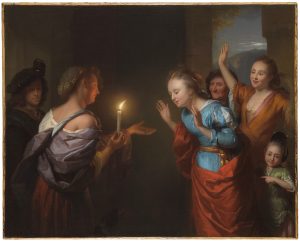Illuminations on the Lectionary readings for Sept. 14, 2025 (Pentecost 14C/Proper 19)

Parable of the Lost Piece of Silver (c.1680), oil painting on canvas by Godfried Schalcken (1643-1706). The Leiden Collection, New York. Click image to enlarge.)
First Reading (Track One): Jeremiah 4:11-12, 22-28
Scripture is full of apparent contradictions. One verse might portray God as dealing destruction with righteous, stormy anger. But open your Bible to another page and find an image of overwhelming, steadfast love. Happily, divine love ultimately prevails. This week’s passage from Jeremiah shows us an angry side of God in an image that might remind us of a loving parent brought to rope’s end by misbehaving children. “My people are foolish,” the prophet’s vision of God declares. “They are stupid children … they have no understanding.” The promised land shall be desolated, God warns. Yet even so, God will not fully destroy the people or their land.
First Reading (Track Two): Exodus 32:7-14
When Moses traveled up to the cloudy top of Mount Sinai, the people left below were afraid. In their fear, they created a golden calf and worshiped it as an idol. At the beginning of Sunday’s reading, God is righteously angry, wrathfully deciding to kill all these ungrateful people and start over again. This new nation, God declares, will no longer descend from Abraham but from the offspring of Moses. But Moses pushes back against this idea. When Moses reminds God of the covenant made at Sinai with Abraham’s family, followed by their long journey out of Egypt, God shows mercy and relents.
Psalm (Track One): Psalm 14
Psalm 14 resonates with Jeremiah’s vision of God’s impatient anger with a troublesome people. Jeremiah’s angry words about the people’s stupidity and foolishness are repeated in the Psalmist’s scorn for fools, corrupt people, and doers of abominable deeds. Yet at the end, the Psalm offers hope: God will ultimately restore the people’s fortunes amid gladness and rejoicing.
Psalm (Track Two): Psalm 51: 1-10
This portion of Psalm 10 imagines the guilt and shame felt by King David after he had sent his loyal soldier Uriah to certain death in battle in order to cover up David’s adulterous affair with Uriah’s wife, Bathsheba. This Psalm imagines David’s repentant cry when the prophet Nathan shocked the king into recognizing his great sin.
Second Reading: 1 Timothy 1:12-17
During the rest of September, we’ll read from the two short letters of Timothy. Although they are framed as letters of pastoral advice written by Paul to his associate Timothy, modern scholars have concluded they were actually written by a later Christian leader in Paul’s name. Composed in a time when the early church was becoming institutionalized and cautious, they tend to be more strict and dogmatic than Paul’s early letters. We don’t hear that in this passage, though. The writer gives thanks that God forgave Paul’s blasphemy, persecution, and violence, and showered him with Christ’s faith and love.
Gospel: Luke 15:1-10
The Pharisees and the scribes grumbled and complained that Jesus “welcomes sinners and eats with them.” This complaint prompts Jesus to respond with two brief parables that liken God’s care for “sinners” to people who lose important things: a sheep from a flock and a silver coin. When the lost objects are found after an intense search, the people exult with abundant joy and thanksgiving. “Just so, I tell you,” Jesus concludes, “there will be more joy in heaven over one sinner who repents than over ninety-nine righteous people who need no repentance.”
